No need for sex data on domestic abuse?

Yesterday the Domestic Abuse Commissioner launched a survey for survivors of domestic abuse about their experience of using domestic abuse services across England and Wales:
“We are running this survey so that we can understand what is good about domestic abuse services in different areas of the country, and what could be made better. We will tell public bodies like the Government and local councils about our findings so that they can improve domestic abuse services in your area.”
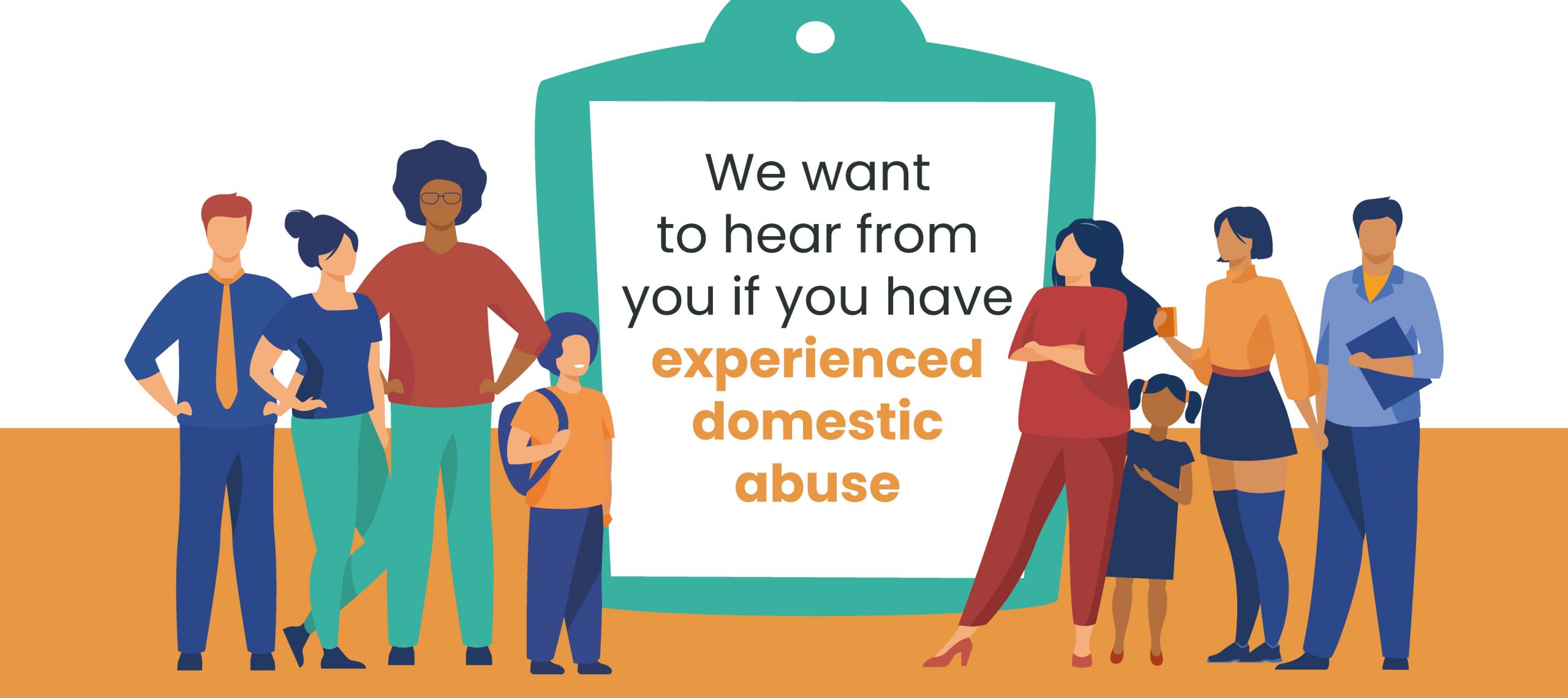
Shockingly, the survey does not ask about respondents what sex they are.
Leaving out the sex question
The survey asks “What is your gender?” And says “we refer to gender as what you identify as rather than your biological sex”. It gives the options Female, Male, Non-binary, Prefer not to say and Other.
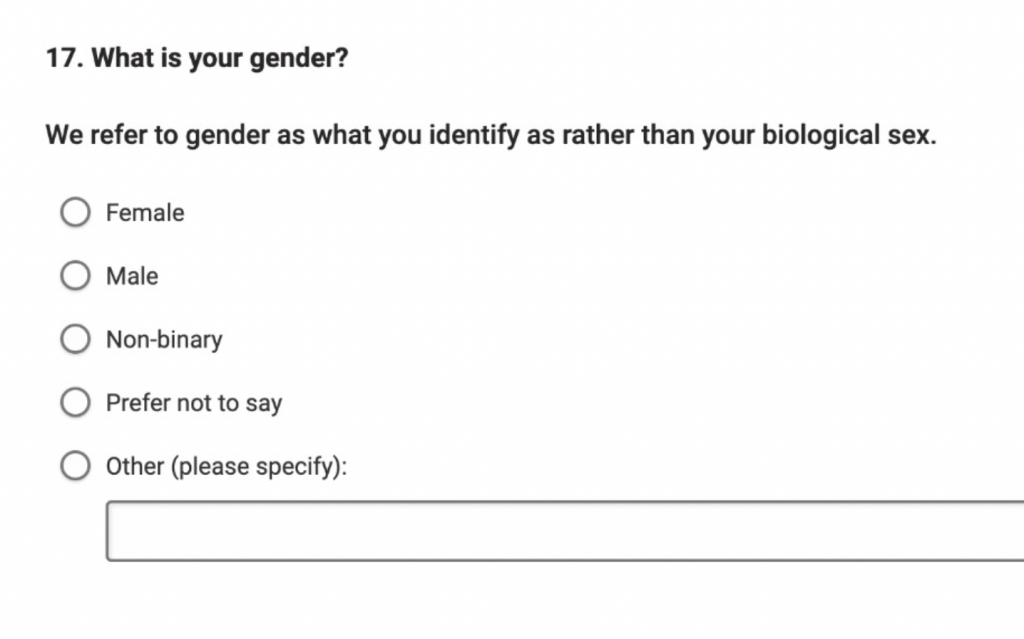
The role of the Domestic Abuse Commissioner
Domestic abuse is an area where sex matters.
The Domestic Abuse Act 2021 was passed this year. It covers victims and perpetrators of both sexes, but recognises that the majority of victims are female. It says that any statutory guidance must take this into account.
The Act created the statutory role of Domestic Abuse Commissioner, and Nicole Jacobs is the first incumbent. The Commissioner’s task is to encourage good practice in preventing domestic abuse; in identifying victims and survivors and perpetrators; and in the protection and provision of support to people affected by domestic abuse.
In pursuance of these statutory functions, the Commissioner may:
- assess, monitor and publish information about the provision of services to people affected by domestic abuse
- make recommendations to any public authority about the exercise of its functions
- undertake or support, financially or otherwise, the carrying out of research
- provide information, education or training
- take other steps to raise public awareness of domestic abuse
- consult public authorities, voluntary organisations and other persons
- cooperate with, or work jointly with, public authorities, voluntary organisations and other persons, whether in England and Wales or outside the UK.
What the Commissioner does not have power to do is to redefine the words male and female as used in the Domestic Abuse Act 2021.
The questions of whether there is adequate provision of single-sex services, and what “single-sex” means, are important ones for the the Domestic Abuse Commissioner.
The Commissioner operates under a framework agreed with the Secretary of State. Next year the Commissioner must publish a report on the overall need and provision for domestic abuse services in England. Her reports will hold local commissioners, statutory agencies and national Government to account and make recommendations, to which government must respond. Before issuing or revising any statutory guidance the Secretary of State must consult the Domestic Abuse Commissioner. The initial draft statutory guidance simply notes that under the Public Sector Equality Duty a local authority might need to commission single-sex services depending on needs.
The survey launched yesterday is part of the information gathering to inform the Domestic Abuse Commissioner’s report to government. Over the summer she also undertook a survey mapping of provision of domestic abuse services across England and Wales.
Nicole Jacobs has long experience of working in the violence against women sector. When the Bill was being discussed in 2019, she highlighted the importance of recognising the “gendered nature” of domestic abuse for commissioning local services. She told parliament:
One would be about the gendered nature of domestic abuse – you have heard this before – and the fact that it would be helpful to have a recognition of that. That is not to discount at all the idea that there are male victims.
Certainly, we know in our day-to-day work that we will see and help male victims of domestic abuse, but we feel and see in the way things are played out locally that unless we recognise the gendered nature of domestic abuse, we can get into all sorts of problems, commissioning services that aren’t as appropriate as they should be, and other practical considerations that stem from that.
There is no sign that Parliament in enacting the law, or the incoming Commissioner understood “male” and “female” to mean fluid identities unrelated to biological sex.
Following attention on Twitter yesterday, the Commissioner tweeted that the survey will collect data on sex. She argues that by capturing information about a respondent’s trans history and their self identified gender the Commissioner’s Office can work out their sex.
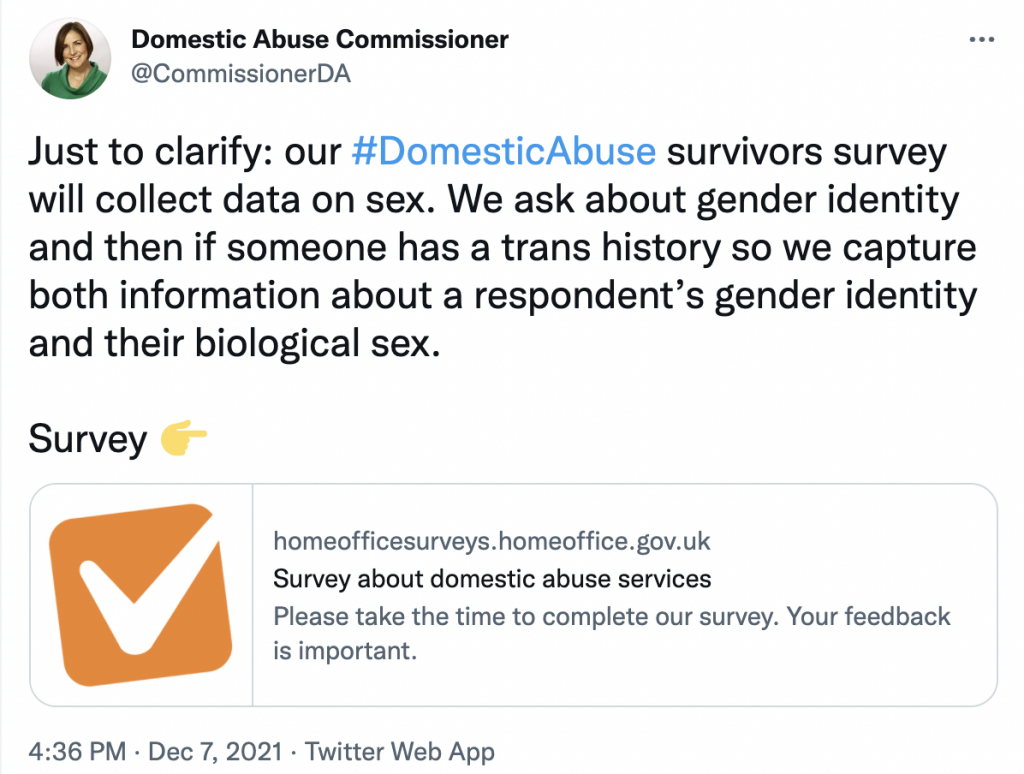
Why not just collect sex data?
There are many problems with this, starting with the most obvious: why not just ask people their sex?
The UK GDPR (Article 5 (1) b) says that “data must be collected for specified, explicit and legitimate purposes and not further processed in a manner that is incompatible with those purposes”.
So if the Domestic Abuse Commissioner wants to record a person’s sex by this roundabout route of triangulating from their self-identified gender and their “trans history”, then the survey should explain that is what they are doing. It doesn’t.
And in practice there are many ways these two pieces of data do not combine to give an accurate indication of a person’s sex.
- If a person answers “non-binary” to the gender question – there is no way for the survey to calculate their sex.
- If a person is gender critical and so answers “prefer not to say” to the “gender” question – there is no way for the survey to calculate their sex.
- If a person answers the “gender identity” question with their sex (perhaps not understanding the distinction) and then skips the trans question or answers “prefer not to say” – there is no way for the survey to calculate their sex, even though the respondent thinks they answered a question about their sex.
If a detransitioner answers the “gender” question with their biological sex and says they have a trans history they will be recorded as the wrong sex.
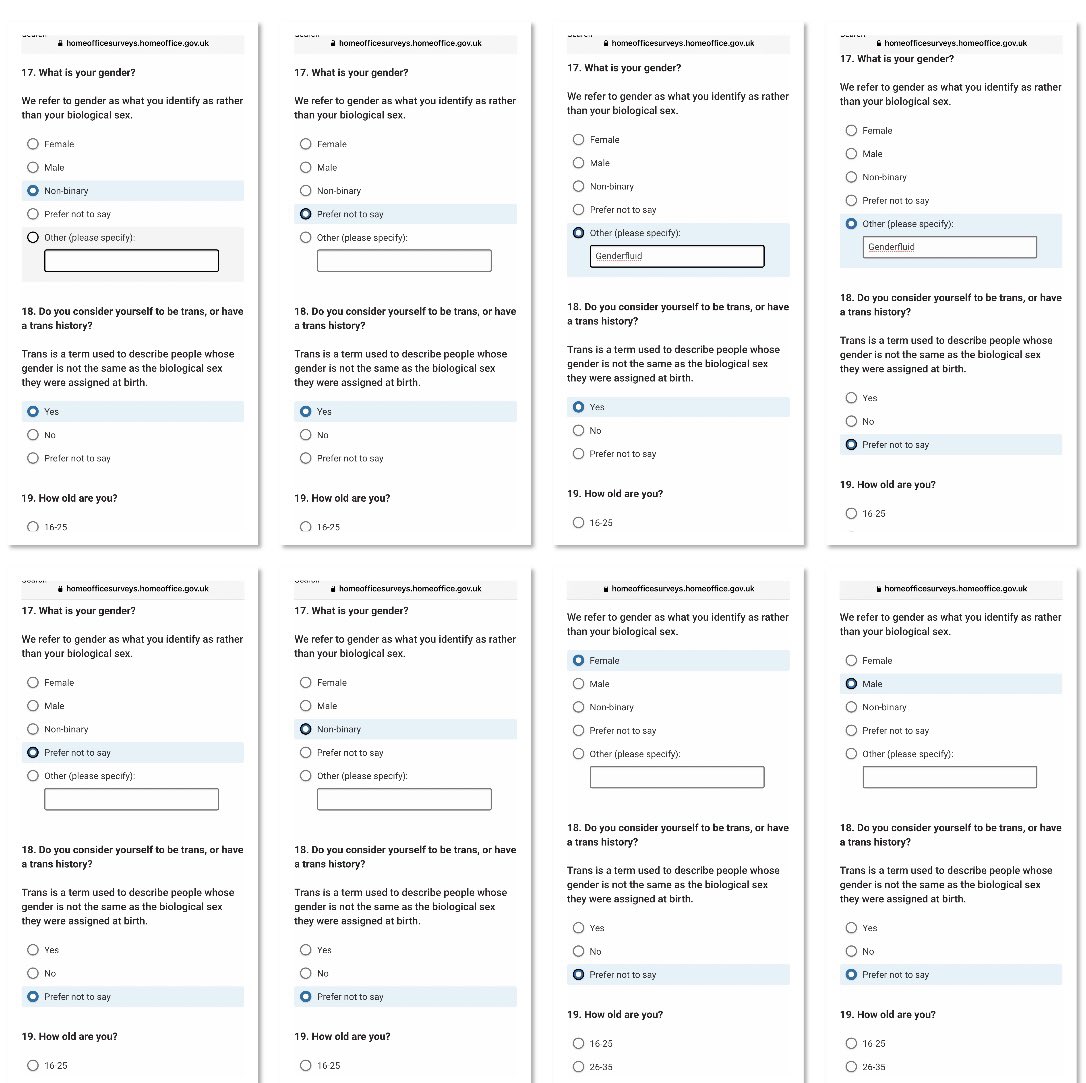
Ignoring their own guidance
The Domestic Abuse Commissioner’s research team says that it abides by Government Social Research ethical principles, and also applies the domestic abuse-specific ‘Research Integrity Framework’, produced by Women’s Aid.
The Women’s Aid Framework says:
Competent DVA research first and foremost must reflect the fundamental principle that women’s and men’s lives differ in significant ways and that these differences always matter.
An intersectional approach recognises that discriminations based on sex, class, or race, for example, operate together and that individuals may suffer from different, distinct, or additional discrimination due to a combination of aspects of their social location and identity.
The Government Social Research Ethical Principles say:
Reaching and recruiting participants from a range of backgrounds and identities ensures the research can meaningfully and accurately include the views of those who will be impacted by the policies the research will inform. This includes the consideration of protected characteristics such as ethnicity, gender, sex, and sexual orientation amongst others. In line with the [Public Sector Equality Duty], researchers should identify potential barriers to participation and take measures to facilitate participation where practical.
The UK Statistics Authority says sex, age and ethnic group should be routinely collected and reported as part of inclusive data collection.
Of course there are also be additional needs and vulnerabilities for people who identify as transgender and the survey rightly asks a question about this. But there is no justification for not including a question on sex.
What about mapping providers?
Looking at the mapping survey of providers carried out earlier in the year, the Commissioner also fudged the sex question, asking service providers if they limit their services to a “single gender or sex”.
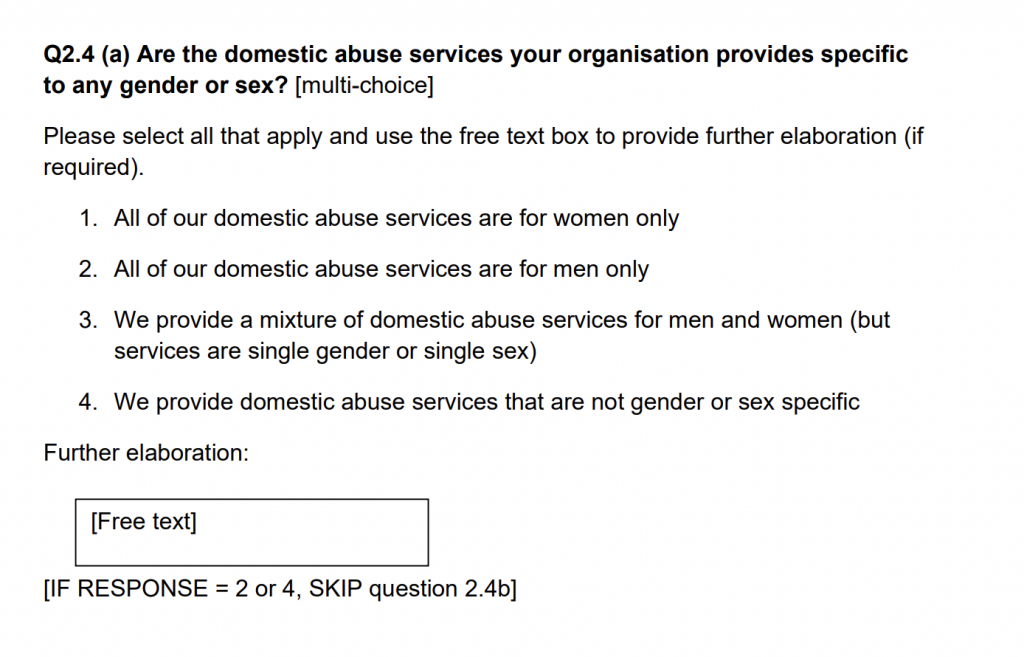
How can the Domestic Abuse Commissioner hope to answer the difficult questions on single-sex services if she won’t even collect basic data?
It is not good enough that those holding policy positions are refusing to grasp this issue, while frontline service providers are left negotiating difficult situations on their own, and with fear of legal action and loss of funding.
Ignoring the law
The Commissioner has a budget of £1 million a year and a mandate to provide public leadership on domestic abuse issues. She has the means and the ability to collect information accurately.
The failure to distinguish the concepts of sex and gender identity is not just unnecessary, wasteful, frustrating, and insulting: it is a dereliction of the duty laid on her by the Act.
We believe it is unlawful, and we have written to her today formally asking her to reconsider. In redefining “female” and “male” away from their statutory meanings the Domestic Abuse Commissioner is overstepping her mandate, just as the Office for National Statistics did over the census.
The Domestic Abuse Commissioner and the staff in her office are free to hold personal beliefs in gender identity ideology: that everyone has a gender identity, that people with male bodies can be female, that there is such a thing as a female penis, and that there is no important difference between the lives of people with male bodies and female bodies. These beliefs are protected by the Equality Act 2010.
But in carrying out her statutory responsibilities, the Commissioner and her office should use the definition of “female” intended by the legislators of the Domestic Abuse Act 2021. We think it is plain that this meaning is biological sex.
We have written to the Domestic Abuse Commissioner today calling for her to:
- withdraw the survey immediately, and reissue it promptly with a straightforward sex question (as well as a question on transgender identity/gender reassignment)
- undertake to write all the service providers who answered Q2.4 of the service providers’ mapping to ask if them to clarify whether they provide a single-sex service, or a mixed-sex service based on gender identity
- confirm publicly that the Domestic Abuse Commissioner’s office uses the definition of “female” and “male” intended by Parliament in enacting the Domestic Abuse Bill 2021 (this does not of course preclude it from also considering the specific needs of victims who are “trans or gender diverse”)
- revise the Framework Document in agreement with the Secretary of State for the Home Office, to make clear the understanding that the words female (and male) in the Domestic Abuse Act 2021 refer to biological sex.
